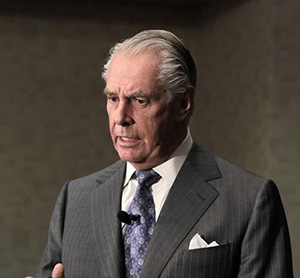Clinical Trial: PROVENGE® + Active Surveillance
This interview, “Clinical Trial: PROVENGE® + Active Surveillance,” is provided by Grand Rounds in Urology’s content partner, Prostatepedia.

Urologist Dr. Bruce Brown is the Chief Medical Officer of Dendreon, makers of the prostate cancer therapeutic vaccine PROVENGE (sipuleucel-T).
Prostatepedia spoke with Dr. Brown about a trial they’re running that will evaluate the effectiveness of sipuleucel-T in reducing disease progression in men on active surveillance.
What is the thinking behind your trial that looks at sipuleucel-T in men with lower risk non-metastatic prostate cancer?
Dr. Bruce Brown: As you know, PROVENGE, which is Dendreon’s product for metastatic castrateresistant prostate cancer (mCRPC), has been approved since 2010. It’s been prescribed to over 30,000 men and has been found to be effective and safe. But that is in a small population of prostate cancer patients – men with metastatic disease that has spread and who have already failed some treatments. When we looked at the whole prostate cancer landscape, we asked how we can potentially get this treatment to more prostate cancer patients who may benefit?
In the United States, about 180,000 men a year are diagnosed with prostate cancer. Over 80% of those men have localized disease. That is much different than the current indication for PROVENGE. Of that 80%, more than 50,000 will go on active surveillance. Active surveillance is a treatment option for localized disease that hasn’t spread.
There are three main treatment options when you are diagnosed with localized prostate cancer. First is active surveillance, which we’ll discuss. There is also radical prostatectomy, which removes the prostate, and radiation therapy to the prostate as well as the tissue outside the prostate. Obviously, radiation therapy and radical prostatectomy have some side effects.
Active surveillance is exactly how it sounds. You “actively” monitor patients, meaning the cancer is not treated but closely observed. You repeat biopsies. You repeat blood tests. You repeat physical exams. The thought is that a lot of prostate cancer patients don’t progress and their disease doesn’t change: it doesn’t spread or metastasize. Their risk of dying of prostate cancer is fairly low. They might do just fine for years without the need for more aggressive treatments that may result in life altering side effects.
We focused on this active surveillance population. Of men who go on active surveillance, about 10% a year will progress and go on to further treatment. We wondered if there was a way for sipuleucel-T to delay or prevent their disease from progressing and needing other treatments. They could go on sipuleucel-T and be spared the side effects of surgery or radiation therapy.
At a high level, that’s why we’re doing this particular trial. But what medical evidence did we have that our drug might be beneficial in this setting? We have several studies that looked at treating men with earlier-stage disease with sipuleucel-T.
These studies weren’t in our labeled indication that we sell commercially. We have evidence that the immune response in men with earlier disease was even greater than in men with advanced disease. That gave us some inkling that the patient’s own immune system will mount a bigger response when sipuleucel-T is given earlier. That makes sense because immunotherapies work best when the burden of tumor is lower, which would be the case in early-stage disease. Immunotherapies also work better when a patient’s own immune system is more robust. Again, as you progress through any disease, especially cancer, your immune system is able to mount less and less of a response the further along you go. So we have evidence that our drug mounts more of an immune response in earlier disease.
We also did another trial where we gave sipuleucel-T to patients with localized disease. Two weeks after they received their last dose of sipuleucel-T we removed their prostate. Then we looked at those prostates and we saw that the immune cells had migrated into the prostate and surrounding tumor cells. It showed us that things were happening from our drug because that doesn’t happen in patients who don’t get our drug.
Again, our drug was causing the immune cells to start doing their work – moving to the tumor, and then hopefully at some point, although we didn’t see it in the trial because we didn’t follow them long enough, to start doing something to those tumor cells. It made us feel better about the fact that by treating patients with sipuleucel-T early, the immune cells would migrate to the tumor.
What can patients expect to happen during the trial?
Dr. Brown: We are looking for patients who have been diagnosed with prostate cancer within the last 12 months. We’re looking for certain patients that fit into roughly a low or intermediate-risk category, based on their biopsy results. These patients don’t have spread of disease, but again, they may progress over the years. These are patients who have been newly diagnosed, whose biopsy fits these particular characteristics, and who are considering active surveillance and perhaps want to be on a treatment that doesn’t involve surgery or radiation therapy.
If a patient decides to enter this trial, he will be randomized. That means he will be put into one of two groups. We will enroll approximately 450 patients—two-thirds of the patients will be treated with a normal dose of sipuleucel-T, which is three treatments two weeks apart. One-third of the patients will not receive sipuleucel-T; they’ll continue to be followed per the active surveillance protocol.
Both groups of patients will follow predetermined study visit follow-ups, which involve blood tests, physical exams, and subsequent biopsies. Our primary endpoint is based on the follow-up biopsies, to see how many in each group have biopsies that get worse.
How long are you planning on following these men?
Dr. Brown: We will do the first biopsy between 12 and 18 months after they are randomized into the trial and then we’ll do a second biopsy between 33 and 39 months. Each patient will be followed for at least three years.
If someone who is reading this is interested in participating, who should he contact?
Dr. Brown: He can visit ClinicalTrials.gov or contact (800) 772-3125. When prompted, please enter study code number: 170101 (do not hit the #, hash or number key). Expect a brief silence until an available agent answers. In the event an agent is not readily available, you will be directed to a voicemail box.
Are there any associated fees?
Dr. Brown: No. Patients don’t pay anything to participate in the trial.
Not a member? Join Prostatepedia to read the rest of this month’s conversations.
View this interview on the Prostatepedia website or leave a comment here.


